In view of the failure of all ex situ rice seed banks to protect the erosion of rice genetic diversity, CIS established Vrihi (Sanskrit name of “rice”), the first non-governmental rice seed bank for farmers, in 1997. Coordinated by its founder Debal Deb, Vrihi Beej Binimoy Kendra is the largest folk rice seed bank in eastern India, established not only to promote cultivation of folk rice varieties, but also re-establish the vanishing culture of non-commercial seed exchange.
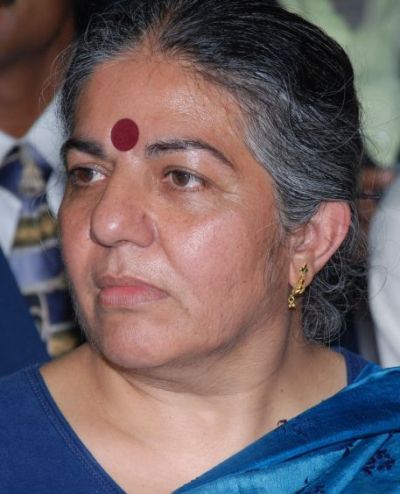
Vrihi began its journey in 1997 as a partner of the nationwide folk crop conservation movement, headed by Dr. Vandana Shiva’s Research Foundation for Science, Technology and Ecology (RFSTE). Dr. Shiva continues to inspire Vrihi’s work.
CIS gratefully acknowledges the funding support it received from RFSTE for Vrihi’s activities till March 2000. Since then, Vrihi has been running on its founder’s personal funding support and donations from friends, especially Dr. Paoloroberto Imperiali of Rome. His donation was instrumental in establishing a research farm, Basudha, where regular, in situ cultivation of all folk rice varieties began in 2001.

[View Slide about Vrihi here]
The search for the vanishing folk rice varieties began in 1995 in remote areas of western and northern districts of West Bengal, where tribal population size and the proportion of unirrigated farms are highest in the State. These marginal areas seemed to be the last bastion of the folk crop varieties, because (a) locally adapted farmers’ landraces perform much better than modern cultivars in marginal environmental conditions, [1] and (b) the tribal farmers are generally too poor to buy expensive agrochemicals and water for irrigation to grow modern rice varieties, and therefore, must rely on the folk varieties. Indeed, most of Vrihi’s accessions came from these ‘backward’ districts.
Vrihi is operating in Rayagada district, Odisha.
LOCATED in village Kerandiguda of Bissamcuttack block, Rayagada district of Odisha, Vrihi Seed Bank is operated by a group of villagers, assisted by Basudha. The nearest rail station is Muniguda. Please inform before arrival.
An increasing number of indigenous farmers from different districts of West Bengal, Jharkhand, Bihar, Orissa, Meghalaya, Karnataka, Maharashtra, Gujarat, Kerala, Tamil Nadu, Punjab and Uttarakhand visit Vrihi to collect seeds. In February 2009 Vrihi received the National Plant Genome Saviour Award from the Plant Variety Protection & Farmers’ Rights Authority, Government of India.
Vrihi Receives NO Institutional Support. Vrihi Solicits Your Support
The circle of Vrihi’s seed exchange membership has considerably expanded over the past 20 years: from a modest number of 21 in the early 1998 to 1680 by early 2015, covering 8 States of India. As of April 2019, more than 7600 farmers from 10 States have exchanged with Vrihi seeds of 910 rice varieties. In two Blocks of Koraput district, Odisha, we distributed seeds of selected endangered folk varieties among the indigenous farmers, who have come forward in large numbers to grow these varieties on their own farms, in spite of no financial return.


The Vrihi Seed Exchange Network now consists of more than 6000 indigenous farmers who have directly or indirectly received rice seeds from Vrihi and continue to cultivate and exchange these seeds among them.
Why exchange?
It is well known that with the onset of the Green Revolution in the 1960s, “high yielding crop varieties has resulted in the replacement of numerous landraces possessing several important genes”[2]. With the rapid disappearance of folk varieties, farmers have perforce become entirely dependent on the commercial seed suppliers for their crop. Until the advent of the seeds market, thousands of farmer landraces had spread across wide areas through informal seed exchange among farmers. Seeds used to be a precious gift to relatives and friends. Because crop seeds were traditionally considered to be a commons that belonged to the community, there was no scope for its commercial appropriation.
Extensive field surveys in remote parts of the country in search of heirloom crop varieties reveal that an astonishing genetic diversity of rice (and other crops) still survives in indigenous societies where seed exchange continues. Some folk rice varieties were also conserved by indigenous farmers due to their cultural value. Agricultural modernization, involving external supply of seeds has already obliterated much of our heirloom crop genetic diversity as well as local food cultures. To halt further erosion of the rice genetic diversity, customary seed exchange systems need to be rejuvenated. This can be done only by establishing multiple seed exchange centres in the country.
Vrihi not only promotes seed exchange on its premises, but also motivates farmers to establish their own community seed banks.
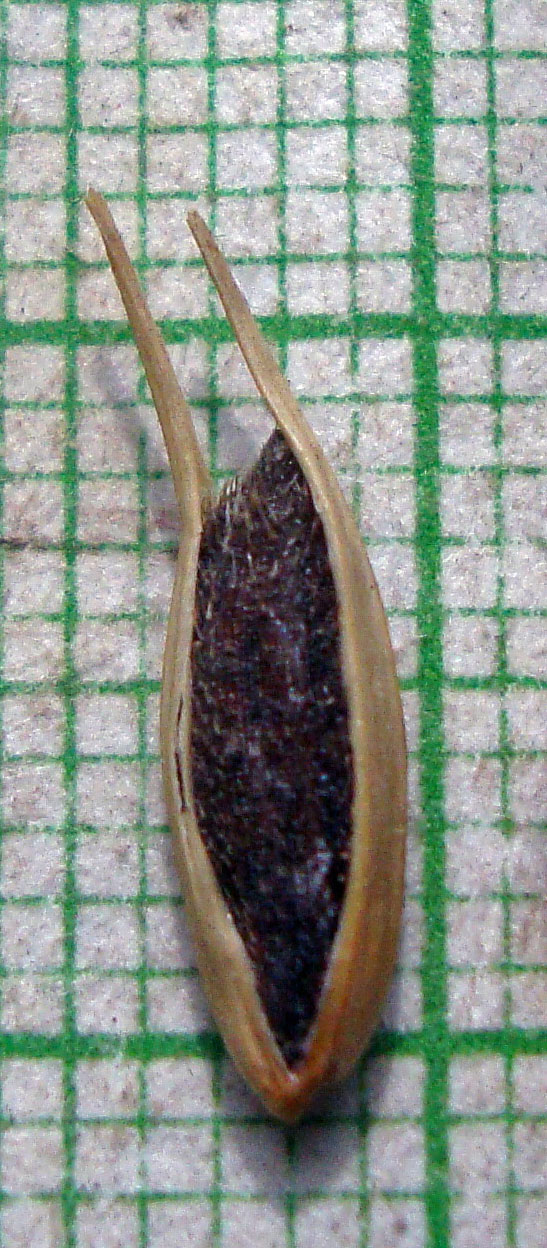
As of February 2021, the seed stock of Vrihi is composed of 1440 rice land races collected from indigenous farmers of India, Bangladesh, Sri Lanka, Pakistan, Thailand, Korea, the Philippines and Italy. Vrihi’s awareness campaign for folk crop seed saving has slowly overcome the initial intransigence of farmers. With an inchoate understanding that folk crop genetic diversity would ensure the country’s food security, many farmers have come forward to donate seeds, and pledged to save and exchange those seeds with friends, kins and neighbours. Vrihi’s collection has thus expanded by accessions from interior villages of West Bengal, Bihar, Orissa, Jharkhand, Assam, Meghalaya, Tripura, Manipur, Nagaland, Arunachal Pradesh, Chhattisgarh, Uttarakhand, Maharashtra, Karnataka, Kerala and Tamil Nadu. Rice samples from Bangladesh, Nepal, Pakistan, Sri Lanka, Korea, Italy and the Philippines, donated by farmers and conservationists.
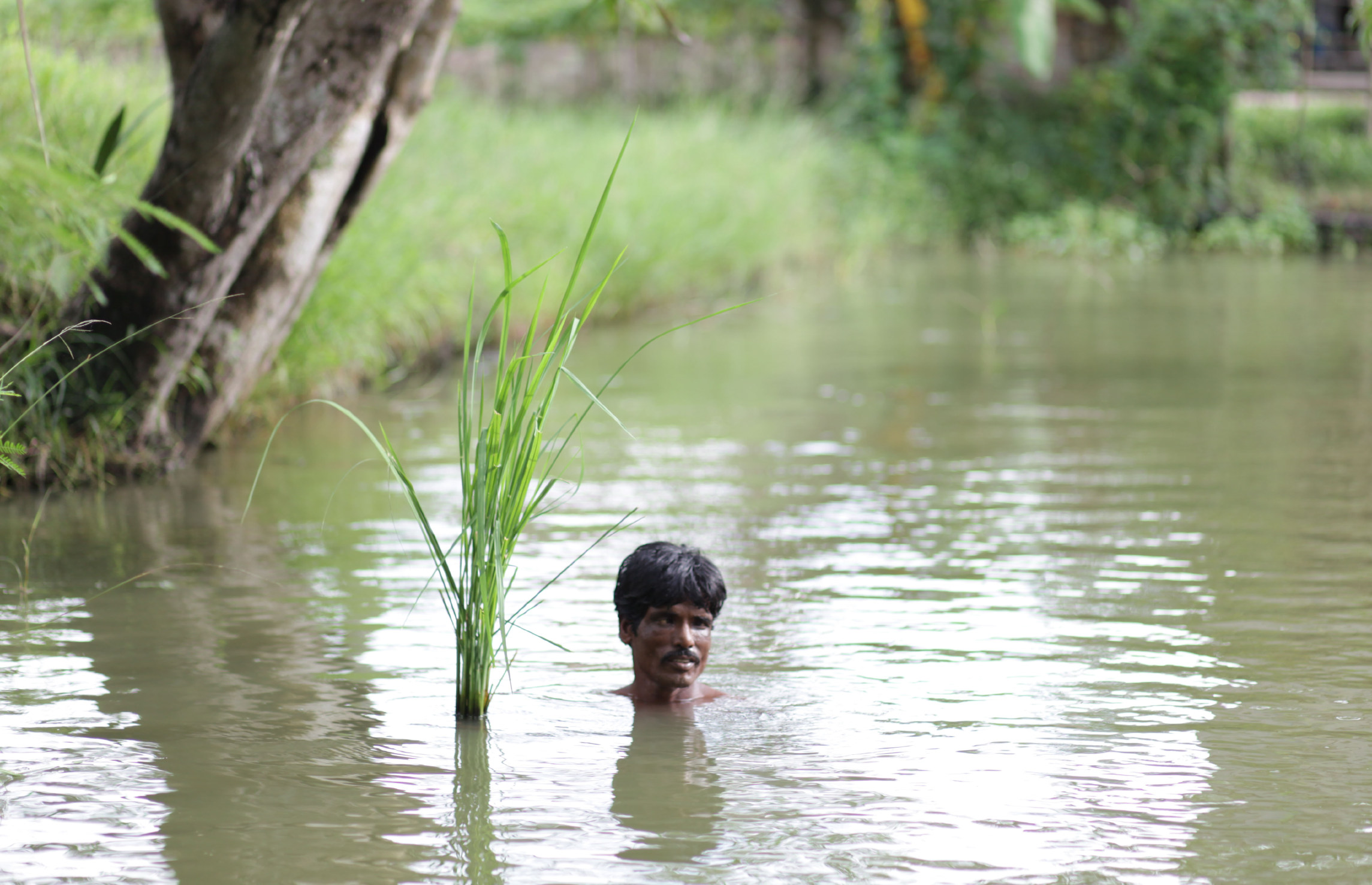


Vrihi’s collection includes a number of unique rice varieties. An example is jugal, the double-grain rice variety. Another amazing variety is sateen, the triple-grain rice. Ramigali from Chhattisgarh has sterile lemmas elongated as wing-like appendages. Kharah and Makhan are landraces with purple culms and leaves. There are numerous varieties that can withstand drought, flood and salinity, or have resistance to diverse pests and diseases. Hundreds of landraces with diverse pigmentation, culinary properties and valuable agronomic traits have been characterized, documented and published for the first time by Vrihi.
Seed Exchange Protocol
Any farmer can receive any indigenous rice variety, free of cost, from Vrihi seed bank at Kerandiguda village. The seed exchange centre is open for farmers every month from March through June. The office closes in the middle of June.
Vrihi assists farmers who intend to take rice seeds in choosing the rice varieties appropriate for his/her farm’s land type, and soil characteristics, and local climatic conditions. In case a farmer visits the seed bank in the first week of any month between March and June, and finds it closed upon his/ her arrival, s/he may leave his name and address on a slip of paper and return home. S/he may also mention the name of a variety s/he would intend to receive, or just the type of land (rain fed upland/ irrigated medium land/ deep lowland) where s/he would intend to grow the seeds. Vrihi volunteers will take the appropriate rice seeds to his/ her doorstep.

In order to receive seeds from Vrihi the farmer must give, in exchange, seeds of at least one folk rice variety (about 1 kg), which would then be passed on to another farmer. In case the farmer does not have any folk variety seeds to exchange, s/he must pay a ‘security deposit’ for obtaining a packet of 1 kg of seeds. A paper receipt is issued against this payment, which is refunded when the farmer returns 2 kg of that rice after harvest. This arrangement is to ensure cultivation and multiplication of the seeds.
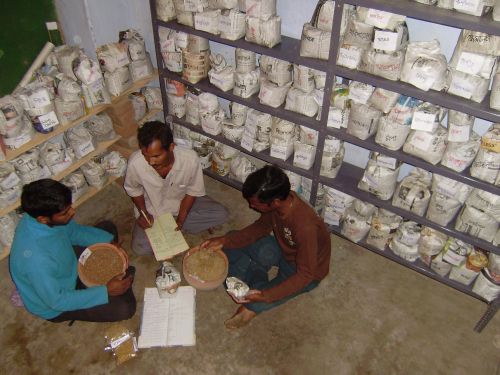
All rice varieties are being cultivated on the Basudha research farm of the Centre for Interdisciplinary Studies. Every year, samples of all rice varieties are brought from Vrihi and grown in small plots at Basudha. ‘Core sample’ panicles from each plot are harvested and stored for the next season. In order to obviate chances of cross-pollination between varieties grown on neighbouring plots, an innovative method of transplanting varieties with asynchronous flowering dates is employed[3].
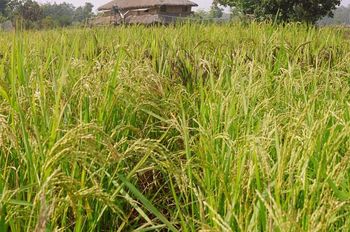
Agronomic and morphological characteristics of each rice variety are assessed, following the International Plant Generic Resources Institute guidelines. Special agronomic features like resistance to pests and pathogens and adaptations to different edaphic conditions are also empirically tested on trial plots. At Basudha, farmer-researchers have developed eight new varieties through crossing and selective breeding of various landraces.
Disseminating Seed Banks
Vrihi, operating in Rayagada district, Odisha, is currently South Asia’s largest folk rice seed bank. Vrihi has founded, co-founded, and enriched several rice seed banks in different parts of the country, by donating hundreds of valuable seeds of vanishing rice varieties. Over the past 25 years, Vrihi has helped found local farmers’ seed banks in West Bengal (Paschim Sridharkati Unayan Samiti of North 24 Parganas district, Panchal Susthayi Krishi Udyog Samiti in Bankura district, Richharia Seed Bank in Bardhaman district); Odisha (farmers seed banks in Rayagada district, Bargarh district and Koraput district), Karnataka (Sahaja Samruddha’s rice seed bank in Mandya district), Maharashtra (Maharashtra Gene Bank in Nanded district), and Kerala (Paithrkam Chathamangalam Seed Bank in Kozhikode district).
Publications
Vrihi distributes a set of posters and handbills for indigenous farmers, describing
a) the benefits of conserving and growing folk rice varieties in indigenous farms, especially in limiting soil and climatic conditions;
b) the risks of genetically engineered crops that are being illegally commercialized by Monsanto Co. and its associates;
c) the risks and costs of chemical farming, which can be eliminated by ecological agriculture.
The handbills are in simple Bengali language. Some of these are also translated into Oriya for distribution in Orissa, in collaboration with local NGOs.
Vrihi documented India’s first copyrighted biodiversity register of folk rice varieties in 2000.[4] The copyright is held by Vrihi as a consortium of farmers who cultivate and exchange the rice varieties on their farms. The register gives a list of all farmers who either donated or received different rice seeds for in situ conservation. An enlarged and updated version of this register, incorporating description of characteristics of 416 rice landraces, was published in 2005.[5]
An ecological agriculture primer for farmers, describing methods of composting, seed saving, seed purification, nutrient management, pest and disease management, and water conservation, is forthcoming[6]
How to get there
Vrihi Beej Binimoy Kendra shifted in 2011 from Bengal to a village in Rayagada district, Odisha.
The nearest airport is Vishakapatnam, and the nearest railway station is Muniguda. Take a train to Muniguda in southern Odisha, and then ride an auto-rickshaw or taxi to Kalipanga village railway crossing (30 min. drive). After that, you will need to walk to Basudha farm.
References
[1] Sperling, L. and M. Loevinsohn (eds), 1997. Using Diversity: Enhancing and Maintaining Genetic Resources On-farm. IDRC. Ottawa, Canada. URL: http://www.idrc.ca/en/ev-9290-201-1-DO_TOPIC.html
[2] NBPGR 2007. Perspective Plan: Vision 2025. National Bureau of Plant Genetic Resources. Pusa Campus, New Delhi. URL: http://www.nbpgr.ernet.in/%5Cdownload%5Cvision_nbpgr_2007.pdf
[3] Deb, Debal 2006. Flowering asynchrony can maintain genetic purity in rice landraces. Current Science (Bangalore) 91: 155-157. URL: http://www.isas.ac.in/currsci/jul252006/155.pdf
[4] Deb, Debal (with A. Ram, D. Bhattacharya, N Mandal and R Mahato) 2000. Folk Rice Varieties of West Bengal: Morphological and Agronomic Characteristics. RFSTE. New Delhi.
[5] Deb, Debal (with D Bhattacharya, K K Jana, R N Mahato, R Pramanik, A Ram and S Sinha) 2005. Seeds of Tradition, Seeds of Future: Folk Rice Varieties of Eastern India. RFSTE. New Delhi.
[6] Deb, Debal, Paribesh Bandhab Krishi Sahayika [A guide to eco-friendly agriculture, in Bengali]. CIS. Barrackpore (forthcoming)
Last Updated (Thursday, 15 August 2020 19:53)

